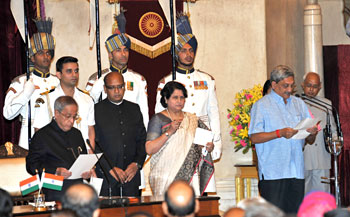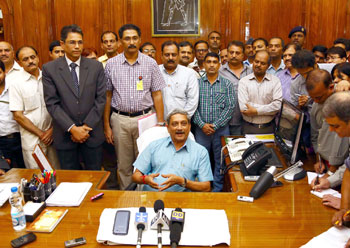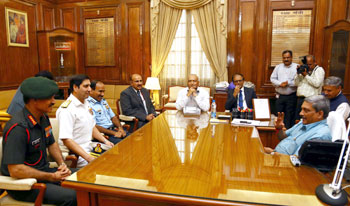INDIAN ARMED FORCES CHIEFS ON
OUR RELENTLESS AND FOCUSED PUBLISHING EFFORTS

SP Guide Publications puts forth a well compiled articulation of issues, pursuits and accomplishments of the Indian Army, over the years

I am confident that SP Guide Publications would continue to inform, inspire and influence.

My compliments to SP Guide Publications for informative and credible reportage on contemporary aerospace issues over the past six decades.
- Interim Defence Budget 2024-25 — An Analysis
- Union Defence budget 2024
- Indian Army: In quest of greater firepower and policy recommendations for gaps
- Indian Army Annual Press Conference 2024
- 6G will transform military-industrial applications
- Tata Boeing Aerospace Delivers 250 AH-64 Apache Fuselages, Manufactured in India
Agenda for the new Raksha Mantri
 |
By Admiral Arun Prakash (Retd) Former Chief of the Naval Staff, Indian Navy |
If there is one lesson we should have learnt during our 67 years as a sovereign republic, it is that security shortcomings, both internal and external, have repeatedly served to distract our attention and divert scarce resources away from the pursuit of development. The history of India's post-independence conflicts has conclusively proved that the "guns Vs butter" debate is futile. Development can take place only in a secure environment, and we must have both guns and butter.

as Cabinet Minister to Shri Manohar Parrikar, at a Swearing-
in Ceremony.

charge as new Defence Minister.

officials of the Ministry and Armed Forces after taking charge
as new Defence Minister, in New Delhi on November 10,
2014. The Minister of State for Defence, Rao Inderjit Singh,
the Defence Secretary, Shri R.K. Mathur, the Secretary
(Defence Production), Shri G Mohan Kumar, the Secretary
Ex-Servicemen Welfare, Shri Prabhudayal Meena, the Chief
of the Air Staff, Air Chief Marshal Arup Raha, the Chief of
Naval Staff, Admiral R.K. Dhowan and the Chief of Army Staff,
General Dalbir Singh are also seen.
The hawks amongst us loudly bemoan the steady decline in India's defence expenditure, which has hit a low of 1.74 percent of the GDP. The common man, on the other hand, wants to know whether the Rs. 224,000 crore ($38 billion) recently voted for defence is being spent wisely enough to buy us the security we need. He asks: are India's core national interests being safeguarded; are our borders and territories inviolate; and are our citizens protected from the threat of terror-strikes? These are all valid questions, given China's increasingly aggressive attitude and Pakistan's relentless use of cross-border terrorism as a low cost weapon.
The term heard most commonly in India's national security discourse is "surprise". It is used in the context of the 1947, 1962, 1965 and Kargil conflicts, as well as episodes such as the IC-814 hijacking and the 26/11 Mumbai terror strike and denotes repeated intelligence failures. A closely related phrase, heard only in whispers, is "lack of preparedness" of the armed forces.
Public memory being short, we have forgotten many of our past blunders. But to continue ignoring dire warnings that emanate from South Block about the military's current lack of combat-readiness would be folly of the highest order.
A reality check will reveal that the reassurance we derive from our large conventional forces and expensive nuclear arsenal may be deceptive; for two reasons. First; the languid and wayward functioning of the Ministry of Defence (MoD) has, over the past decade, served to erode the qualitative and/or quantitative edge that the armed forces had over potential adversaries. Second, successive governments having refused to integrate the Service HQs with the MoD and to encourage 'jointness' amongst the three armed forces, our national security structure is not only flawed but badly outdated and likely to fail in the face of a 21st century conflict.
So far, India's political leadership, in an unfortunate display of indifference, has distanced itself from national security issues. At the same time, the armed forces have been deliberately excluded from a role in national security decision-making. The net result is a conundrum in which, India has collected, at huge expense, the trappings of a major military power without having a real idea of how to leverage them in the national interest. Further evidence of strategic naiveté is to be found in the adoption of a model - unique amongst democracies - in which the armed forces are placed under the total control of a totally civilian bureaucracy, with limited comprehension of complex defence and security matters; especially those related to high-tech weapon-acquisition programmes.
In the decisive, dynamic and technically-savvy Manohar Parrikar, the PM has possibly found the best person to entrust the challenging defence portfolio to. However, the unconscionable six-month delay in nomination of a Raksha Mantri (RM) must have certainly have caused damage, to this vital Ministry, already suffering from a decade of lethargy, indecision and myopic vision.
The RM's first priority must be to eliminate the paranoid suspicion of our patriotic and apolitical armed forces; a lingering Nehruvian legacy which has kept them outside the edifice of the Government of India (GoI). This would logically lead to the next important step of integrating the Service HQs with MoD and constituting a single-point source of military advice to the RM/PM. This vital step, recommended by successive Standing Parliamentary Committees on Defence, as well as by government-constituted Task Forces, has remained stalled by lack of political will and entrenched bureaucratic resistance.
Concurrent with these measures, a review of the "1961 GoI Rules of Business" must be undertaken in order that the three service chiefs are nominated as functionaries of the GoI; responsible to the PM/RM for the defence of India's land, maritime and aerospace domains.
The last but most important action-point for the RM would be the radical restructuring of our ineffective and unproductive defence research and production organizations. This would be the first step to laying the foundations of a dynamic indigenous arms industry.
All these measures, while reinforcing political control of the armed forces, will bring our higher defence structures on par with other major democracies and ensure that the defence budget translates into genuine security.
Lastly, one hopes that the new RM will gather sufficient self-confidence to venture on an examination of the internal health of our armed forces. Events of the recent past, including misdemeanours at senior ranks, episodes of mass indiscipline and occurrence of serial mishaps have raised concerns amongst the public.
Given understanding and synergy between the RM and the three Service chiefs, it should be possible to identify the systemic flaws that have crept into our national security system and to institute enduring solutions.





